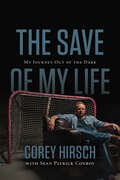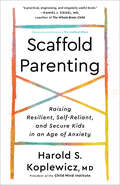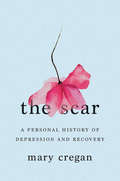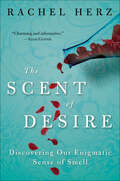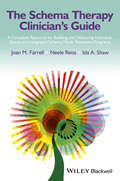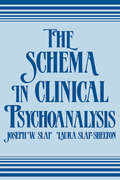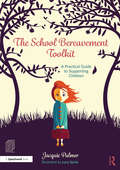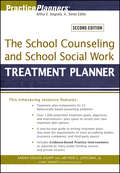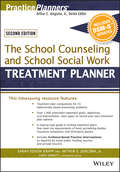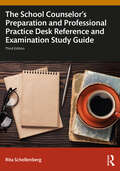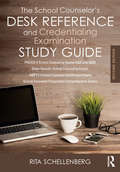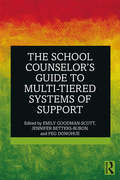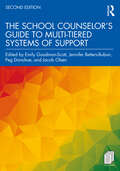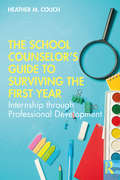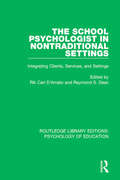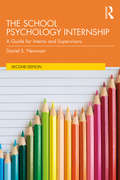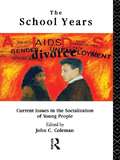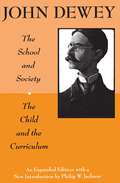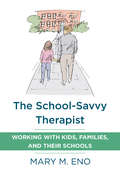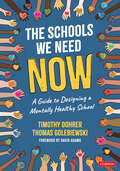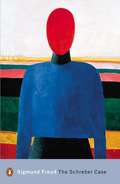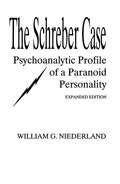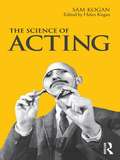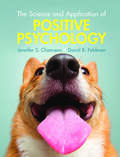- Table View
- List View
The Save of My Life: My Journey Out of the Dark
by Corey Hirsch Sean Patrick ConboyA riveting look behind the mask of an NHL goalie, The Save of My Life offers understanding and hope to anyone living with mental illnessBy the time he was twenty-two years old, goaltender Corey Hirsch had realized his childhood dream of playing in the NHL, won an Olympic medal and drunk from the Stanley Cup. While he excelled on the ice, out of the net Hirsch was plagued by persistent dark thoughts and ceaseless anxiety. On days when he could barely get out of bed, he was able to push aside the endless loop of dark thoughts running inside his brain long enough to win a game. But as soon as he got back home, the agonizing cycle started all over again. And it continued, until finally he was able to confide in a team trainer who helped him get the professional treatment he needed. Diagnosed with obsessive-compulsive disorder, Hirsch was able to embark on the rocky road to recovery. As one of the first professional athletes to talk openly about mental health, Hirsch wrote about his OCD for the Players’ Tribune. His piece remains one of their most-read articles ever.As Hirsch says, “I am not insane. I am not a bad person. I am not weak. I have an illness, and there is a treatment.”
The Scaffold Effect: Raising Resilient, Self-Reliant, and Secure Kids in an Age of Anxiety
by Harold S. KoplewiczPrevent and counteract the general anxiety and emotional fragility prevalent in children and teenagers today—a new parenting philosophy and strategies that give children the tools to flourish on their own.&“A master synthesizer of attachment science, medical practice, and his own experience as a father, Harold Koplewicz capably and compassionately leads us through the art of scaffolding, from early childhood through the important adolescent period.&”—Daniel J. Siegel, MD, author of The Whole Brain ChildJust as sturdy scaffolding is necessary when erecting a building and will come down when the structure grows stable, good parenting provides children with steady and warm emotional nourishment on the path toward independence. Never-ending parental problem-solving and involvement can have the opposite effect, enabling fragility and anxiety over time. In The Scaffold Effect, world-renowned child psychiatrist Harold Koplewicz introduces the powerful and clinically tested idea that this deliberate build-up and then gradual loosening of parental support is the single most effective way to encourage kids to climb higher, try new things, grow from mistakes, and develop character and strength. Explaining the building blocks of an effective scaffold from infancy through young adulthood, he expertly guides parents through the strategies for raising empowered, capable people, including:• Lay a solid foundation: The parent-child relationship needs to be made from the concrete mixture of emotional availability, positive reinforcement, clear messaging, and consistent rules. From this supportive base, your will forge a bond that will survive adolescence and grow stronger into adulthood.• Empower growth: Skyscraper or sprawling ranch—the style of your child&’s construction is not up to you! Scaffold parenting validates and accommodates the shape the child is growing into. Any effort to block or control growth will actually stunt it.• Stay on their level: Imagine being on the ground floor of a house and trying to talk to someone on the roof. The person on the roof will have to &“talk down&” to you or yell. If your child&’s building and your scaffold are on the same level, you can speak directly, look each other in the eye, and keep the lines of communication open. Drawing on Dr. Koplewicz&’s decades of clinical and personal experience, The Scaffold Effect is a compassionate, street-smart, and essential guide for the ages.All of the author&’s proceeds from the sale of this book will be donated to the Child Mind Institute.
The Scar: A Personal History Of Depression And Recovery
by Mary CreganA graceful and penetrating memoir interweaving the author’s descent into depression with a medical and cultural history of this illness. At the age of twenty-seven, married, living in New York, and working in book design, Mary Cregan gives birth to her first child, a daughter she names Anna. But it’s apparent that something is terribly wrong, and two days later, Anna dies—plunging Cregan into suicidal despair. Decades later, sustained by her work, a second marriage, and a son, Cregan reflects on this pivotal experience and attempts to make sense of it. She weaves together literature and research with details from her own ordeal—and the still visible scar of her suicide attempt—while also considering her life as part of the larger history of our understanding of depression. In fearless, candid prose, Cregan examines her psychotherapy alongside early treatments of melancholia, weighs the benefits of shock treatment against its terrifying pop culture depictions, explores the controversy around antidepressants and how little we know about them—even as she acknowledges that the medication saved her life—and sifts through the history of the hospital where her recovery began. Perceptive, intimate, and elegantly written, The Scar vividly depicts the pain and ongoing stigma of clinical depression, giving greater insight into its management and offering hope for those who are suffering.
The Scent of Desire: Discovering Our Enigmatic Sense of Smell
by Rachel HerzThe Scent of Desire explores our sense of smell in a compelling and engaging manner, from emotions and memory to aromatherapy and pheromones.In this first and definitive book on the psychology of smell, neuroscientist Rachel Herz traces the importance of smell in our lives, from nourishment to procreation to our relationships with the people closest to us and the world. Smell was the very first sense to evolve and is located in the same part of the brain that processes emotion, memory, and motivation. To our ancestors, the sense of smell wasn't just important, it was crucial to existence and it remains so today. Our emotional, physical, even sexual lives are profoundly shaped by both our reactions to and interpretations of different smells.Herz examines the role smell plays in our lives, and how this most essential of senses is imperative to our well-being, investigating how our sense of smell functions, what purpose it serves, and shows how inextricably it is linked to our survival. She introduces us to people who have lost their ability to smell and shows how their experiences confirm this sense's importance by illuminating the traumatic effect its loss has on the quality of day-to-day living. Herz illustrates how profoundly scent and the sense of smell affect our daily lives with numerous examples and personal accounts based on her years of research.For anyone who has ever wondered about human nature or been curious about the secrets of both the body and the mind, The Scent of Desire is a fascinating, down-to-earth tour of the psychology and biology of our most neglected sense, the sense of smell.
The Schema Therapy Clinician's Guide
by Neele Reiss Ida A. Shaw Joan M. FarrellThe Schema Therapy Clinician's Guide is a complete clinical resource for psychotherapists implementing schema therapy, group schema therapy or a combination of both in a structured, cost-effective way. The authors provide ready-made individual and group sessions with patient hand-outs. A unique resource providing ready-made individual and group schema therapy sessions, linked across schema modes, allowing clinicians to pick and choose what they need or adopt a full integrated individual and group program which can be delivered over a range of treatment lengths from a six week intensive program to a one year outpatient treatmentApproaches treatment by targeting maladaptive Schema Modes rather than specific disorders, thus increasing clinical flexibility and ensuring shelf life through changes in diagnostic classificationProvides step-by-step instructions and tips for therapists, along with a wealth of unique clinical resources including sample scripts, handouts, session exercises, assignment forms and patient materialsMeets the current need for effective clinical treatments that can provide tangible effects on time and on budget
The Schema in Clinical Psychoanalysis
by Joseph W. Slap Laura Slap-SheltonSlap and Slap-Shelton proffer the schema as the basis of an internally consistent and clinically relevant model of the mind. Wedded to the dynamic and genetic points of view, the schema model accommodates the clinical realities of trauma, repetition, and sublimation while dispensing entirely with the abstract concepts of traditional metapsychology.
The School Bereavement Toolkit: A Practical Guide to Supporting Children
by Jacquie PalmerPractical and accessible, this guidebook is designed to help staff in schools support bereaved children in their care. Providing information and guidance on practical issues around bereavement and indicating some of the issues that might require extra thought or assistance, this book makes accessing relevant information as easy and quick as possible.When busy school staff are faced with a bereaved child, the prospect can be daunting. What do I say? What can I do? Will I make it worse? Have I got time to do this? This book is a toolbox to give staff confidence in helping bereaved young people. Information is easily accessed and simple to use, giving staff quick and practical help. There are sections on what will help and what will not; also included are photocopiable worksheets and tools to aid children and young people to explore their grief, as well as information on how school communities can share the news and manage an initial response.With age-appropriate guidance to help school staff working in both primary and secondary settings, this key guide provides quick-to-access information for those not trained in child bereavement to help individual children or whole classes following a loss.
The School Counseling and School Social Work Treatment Planner
by Arthur E. Jongsma Jr. Sarah Edison Knapp Carey DimmittThe Bestselling treatment planning system For mental health professionalsThe School Counseling and School Social Work Treatment Planner, Second Edition provides all the elements necessary to quickly and easily develop formal treatment plans that satisfy the demands of HMOs, managed care companies, third-party payors, and state and federal agencies.New edition features empirically supported, evidence-based treatment interventions including coverage of disruptive classroom behaviors, reinforcing student success, bullying, peer conflict, and school violenceOrganized around 33 behaviorally based presenting problems in treating students who experience social and emotional difficulties, including social maladjustment, learning difficulties, depression, substance abuse, family instability, and othersOver 1,000 prewritten treatment goals, objectives, and interventions--plus space to record your own treatment plan optionsEasy-to-use reference format helps locate treatment plan components by behavioral problemIncludes a sample treatment plan that conforms to the requirements of most third-party payors and accrediting agencies including CARF, The Joint Commission (TJC), COA, and the NCQAAdditional resources in the PracticePlanners® series:Documentation Sourcebooks provide the forms and records that mental health professionals need to efficiently run their practice.Homework Planners feature behaviorally based, ready-to-use assignments to speed treatment and keep clients engaged between sessions.For more information on our PracticePlanners® products, including our full line of Treatment Planners, visit us on the web at: www.wiley.com/practiceplanners
The School Counseling and School Social Work Treatment Planner, with DSM-5 Updates, 2nd Edition (PracticePlanners)
by Arthur E. Jongsma Jr. Sarah Edison Knapp Catherine L. DimmittThis timesaving resource features: Treatment plan components for 33 behaviorally based presenting problems Over 1,000 prewritten treatment goals, objectives, and interventions—plus space to record your own treatment plan options A step-by-step guide to writing treatment plans that meet the requirements of most accrediting bodies, insurance companies, and third-party payors Includes Evidence-Based Practice Interventions as required by many public funding sources and private insurers PracticePlanners® THE BESTSELLING TREATMENT PLANNING SYSTEM FOR MENTAL HEALTH PROFESSIONALS The School Counseling and School Social Work Treatment Planner, Second Edition provides all the elements necessary to quickly and easily develop formal treatment plans that satisfy the demands of HMOs, managed care companies, third-party payors, and state and federal agencies. New edition features empirically supported, evidence-based treatment interventions including coverage of disruptive classroom behaviors, reinforcing student success, bullying, peer conflict, and school violence Organized around 33 behaviorally based presenting problems in treating students who experience social and emotional difficulties, including social maladjustment, learning difficulties, depression, substance abuse, family instability, and others Over 1,000 prewritten treatment goals, objectives, and interventions—plus space to record your own treatment plan options Easy-to-use reference format helps locate treatment plan components by behavioral problem Includes a sample treatment plan that conforms to the requirements of most third-party payors and accrediting agencies including CARF, The Joint Commission (TJC), COA, and the NCQA Additional resources in the PracticePlanners® series: Documentation Sourcebooks provide the forms and records that mental health??professionals need to??efficiently run their practice. Homework Planners feature behaviorally based, ready-to-use assignments to speed treatment and keep clients engaged between sessions. For more information on our PracticePlanners®, including our full line of Treatment Planners, visit us on the Web at: www.wiley.com/practiceplanners
The School Counselor's Preparation and Professional Practice Desk Reference and Examination Study Guide
by Rita SchellenbergThis third edition of The School Counselor’s Preparation and Professional Practice Desk Reference and Examination Study Guide is a comprehensive resource for both pre-service and practicing school counselors. It is intended to be used as a school counselor preparation course text, credentialing exam study resource, and comprehensive desk reference.The text material holistically addresses culturally sensitive practices and the professional, legal, and ethical principles of school counseling in today’s public K-12 schools, capturing the past, present, and future of the profession using a personable writing style that engages readers. The material meets preparation criteria for the NBPTS School Counseling National Certification assessment, School Counselor Preparation Comprehensive exams, state-specific school counselor licensure exams, and the Praxis School Counselor exam, which was recently adopted as the exam for earning the ASCA Certified School Counselor (ACSC) credential. The text includes a glossary of important terms, common acronyms, and real-world case studies for enriched discussions and enhanced understanding. Each chapter includes guided reflections and knowledge checks with end-of-chapter exam simulations and case studies to include correct responses and explanations for those responses. A cumulative end-of-text comprehensive simulation exam with responses is also included.The text covers the requisite information pre-service and practicing school counselors need to be the very best twenty-first century school counselors in accordance with contemporary research, the ASCA National Model, CAEP, CACREP, and NBPTS standards.
The School Counselor’s Desk Reference and Credentialing Examination Study Guide
by Rita SchellenbergThe School Counselor’s Desk Reference and Credentialing Examination Study Guide, Second Edition is the only study guide and desk reference on the market that covers the latest ASCA School Counselor Competencies, CACREP Standards, and the CAEP and NBPTS Standards. It effectively prepares students for the Praxis II Professional School Counseling exams (5421 & 0420), NBPTS School Counseling National Certification exam, School Counselor Preparation Comprehensive exams, and state-specific certification exams for the professional practice of school counseling. This revised volume is designed to build knowledge and skills through end-of-chapter practice tests, a full-length practice exam with exam answers and rationales, guided reflections, and case studies. Additional resources include a glossary of important terms and a list of commonly used acronyms within the profession.
The School Counselor’s Guide to Multi-Tiered Systems of Support
by Emily Goodman-Scott Jennifer Betters-Bubon Peg DonohueThe School Counselor’s Guide to Multi-Tiered Systems of Support is the first book to provide school counseling practitioners, students, and faculty with information and resources regarding the alignment and implementation of Comprehensive School Counseling Programs (CSCPs) such as the ASCA National Model and Multi-Tiered Systems of Support (MTSS). This innovative text provides a strong theoretical and research base, as well as practical examples from the field, case studies, and relevant hands-on resources and tools to assist school counselors in comprehending, facilitating, and strengthening the implementation of CSCPs, particularly through MTSS alignment. Furthermore, chapters include pertinent information from the CACREP standards and the ASCA National Model. This book is an essential resource for pre-service and practicing school counselors, as well as their leaders, supervisors, and faculty looking to better understand and utilize the overlap between CSCPs and MTSS, to strengthen school counseling programs to better serve students, schools, and communities.
The School Counselor’s Guide to Multi-Tiered Systems of Support
by Emily Goodman-Scott Jennifer Betters-Bubon Peg Donohue Jacob OlsenThe revision of this innovative book provides school counseling students, practitioners, leaders, supervisors, and faculty with information and resources regarding the alignment and implementation of school counseling, specifically comprehensive school counseling programs. Complementing and expanding upon the audience’s knowledge and implementation of CSCPs such as the ASCA 2019 National Model, chapters include a strong theoretical and research base as well as related practical examples from the field—including case studies of practicing school counselors, and relevant, hands-on resources and tools to assist school counselors facilitate MTSS. New topics such as culturally sustaining and antiracist practice are woven into the chapters, in addition to covering the response to the COVID-19 pandemic, mental health crises, and capturing timely and current practices in K-12 education and school counseling. Innovative, unique, and including a plethora of useful tools and resources, this guide to MTSS and school counseling is ideal for graduate students and current school counselors in the field.
The School Counselor’s Guide to Surviving the First Year: Internship through Professional Development
by Heather M. CouchThe School Counselor’s Guide to Surviving the First Year offers a comprehensive look into the first-year school counseling experience. This practical guide includes topics from internship to professional development from an intimate perspective within the context of real-life scenarios. Drawing from personal experiences, journal articles, textbooks, and excerpts by numerous professional school counselors, it fuses what a school counseling trainee learns in their graduate program and the field experience they get into one unique guide. Emphasizing hands-on approaches, this volume offers personal as well as professional steps toward success in the ins and outs of counseling. This book is a valuable toolkit for the developmental journey of school counselors in-training and beginning school counselors.
The School Psychologist in Nontraditional Settings: Integrating Clients, Services, and Settings (Routledge Library Editions: Psychology of Education)
by Rik Carl D’Amato Raymond S. DeanOriginally published in 1989, school psychology, according to the contributors of this unique volume, is an approach to problem solving, not simply a setting- specific profession. Following Lightner Witmer's original notion, the editors lay a foundation for the field of school psychology in "nontraditional" settings. Such nontraditional practice stems from data showing that school psychologists display skills and abilities that can be applied successfully to a variety of client needs in numerous settings. This special book directly affects both the practicing school psychologist and those in training, as well as professionals and students in clinical child psychology, counseling, and educational psychology.
The School Psychology Internship: A Guide for Interns and Supervisors
by Daniel S. NewmanThe School Psychology Internship is intended to support both doctoral and graduate-level interns and their supervisors (both field and university) in navigating the internship process. Emphasis is placed on the idea that the internship year is a dynamic and formative journey and that interns and supervisors both must be active planners, coordinators, and shapers of the experience. This thoroughly updated 2nd Edition contains an array of helpful resources such as evaluation tools, best practice guidelines, added coverage on doctoral-level training, and sample forms along with all new supplementary materials designed to aid interns in the transition from internship to early career practice.
The School Years: Current Issues In The Socialization Of Young People (Psychology In Progress Ser.)
by John C. ColemanThe School Years provides a challenging and lively collection of essays on key issues affecting young people in the school setting. It is an essential book for all those concerned with adolescence and education. Since the first edition in 1979, major social changes such as unemployment, AIDS, issues of race and gender, and increasing divorce rates have had a direct impact on education and young people. With these dramatice changes in mind, the contributors take an entirely new and up-to-date approach to current controversial issues such as the relationship of home and school, gender roles, morality, delinquency, and peer groups. Contributors include: John Coleman, Trust for the Study of Adolescence; T. Honess, School of Psychology, University of Wales; Peter Kutnick, Department of Education, University of Sussex; Sally Archer, Trenton State College, USA; Philida Salmon, Institute of Education, University of London; Maurice Chazan; David P. Farrington, Institute of Criminology, Cambridge.
The School and Society, and The Child and the Curriculum
by John DeweyAmerica's arch-philosopher of education wrote these two short pieces out of his experience with Chicago's laboratory school which he started in 1896. Dewey's first piece (1915) argues for making the school into a microsociety of the larger one, while in the second (1902) he seeks a curriculum acting as a kind of program for teachers to follow. Teachers can then guide children toward enough self-confidence to be assertive and exercise their capacities. Cited in Books for College Libraries, 3rd ed. Annotation c. Book News, Inc., Portland, OR (booknews.com)
The School-Savvy Therapist: Working With Kids, Families And Their Schools
by Mary EnoWhen it comes to therapy with kids, collaborating with schools and families is essential. Kids encounter problems at school that run the gamut from school violence, to complex systemic problems rooted in poverty or racism, to daily struggles with homework or making friends.Therapists who work with kids typically do not receive training about when and how to contact schools, or about how to work with them collaboratively. The School-Savvy Therapist by Dr. Mary Eno provides a framework, tools, and guidelines for doing just that. Drawing on research, illustrative case examples, and interviews, this practical resource describes what therapists need to know about schools and how they can effectively foster a supportive child–family–school dynamic. From reviewing test results, conducting school observations and attending family–school meetings, to helping parents advocate for their kids and more, this book will help therapists understand the critical role they play in supporting kids who struggle at school.Checklists, questions, and specific guidelines are provided so that both novice and experienced therapists can engage in this work with skill and confidence.
The Schools We Need Now: A Guide to Designing a Mentally Healthy School
by Timothy Dohrer Thomas GolebiewskiPlace mental health at the heart of schooling Our students have always needed our support, but recent events have brought to the forefront the challenges K-12 schools face in supporting their mental health. Now is the time to transform schools into safe and healthy places that enable students not only to learn but thrive. Based on decades of research and proven examples from education professionals and the authors, experts in school leadership and social work, The Schools We Need Now highlights the importance of placing mental health at the heart of schooling and shares a vision for schools that prioritizes student well-being. Inside you’ll discover: Practical ways to improve school climate and mitigate the effects of students’ stress, trauma, depression, and anxiety Preventive activities, school transition and crisis response plans, and community collaboration strategies How to create a comprehensive Mental Health Action Plan that is grounded your school’s culture and climate Examples of schools, classrooms, and organizations that are on the leading edge of creating the schools we need now For every educator who wants to ensure a healthy and equitable school environment for all students, The Schools We Need Now shows you how to create a safe place that protects and supports their academic, social, emotional, and physical growth.
The Schools We Need Now: A Guide to Designing a Mentally Healthy School
by Timothy Dohrer Thomas GolebiewskiPlace mental health at the heart of schooling Our students have always needed our support, but recent events have brought to the forefront the challenges K-12 schools face in supporting their mental health. Now is the time to transform schools into safe and healthy places that enable students not only to learn but thrive. Based on decades of research and proven examples from education professionals and the authors, experts in school leadership and social work, The Schools We Need Now highlights the importance of placing mental health at the heart of schooling and shares a vision for schools that prioritizes student well-being. Inside you’ll discover: Practical ways to improve school climate and mitigate the effects of students’ stress, trauma, depression, and anxiety Preventive activities, school transition and crisis response plans, and community collaboration strategies How to create a comprehensive Mental Health Action Plan that is grounded your school’s culture and climate Examples of schools, classrooms, and organizations that are on the leading edge of creating the schools we need now For every educator who wants to ensure a healthy and equitable school environment for all students, The Schools We Need Now shows you how to create a safe place that protects and supports their academic, social, emotional, and physical growth.
The Schreber Case (Penguin Modern Classics)
by Sigmund FreudThe Schreber Case is distinctive from the other case histories in that it's based on the memoirs of a conjectural patient. Schreber was a judge and doctor of law who lived according to a strict set of principles. His nervous illness first manifested itself as hypochondria and insomnia - which he put down to his excessive workload - but gradually deteriorated into pathological delusion. Believing himself to be dead and rotting, Schreber attempted suicide, and then went on to experience bizarre delusional epsiodes whereby he belived he was being turned into a woman. The course of this extraordinary illness is analysed by Freud in his search for a root cause - could it have been caused by homesexual impulses that Schreber tried to repress?
The Schreber Case: Psychoanalytic Profile of A Paranoid Personality
by William G. NiederlandFirst published in 1984. Routledge is an imprint of Taylor & Francis, an informa company.
The Science Of Acting
by Sam KoganWhat is good acting? How does one create believable characters? How can an actor understand a character if they do not understand themselves? In The Science of Acting, Sam Kogan uses his theories on the relationship between neuroscience, psychology and acting to answer these questions. Practical exercises provide a step-by-step guide to developing an actor's ability, culminating in Ten Steps to Creating a Character. He presents the reader with a groundbreaking understanding of the subconscious and how it can be applied to their acting. The author’s highly original perspective on Stanislavski's teaching gives readers a unique insight into their character’s minds. Sam Kogan studied at the Moscow Institute of Theatre Arts (now the Russian Academy of Theatre Arts) under the tutelage of Professor Maria Knebel. He established The Science of Acting, a complete stand-alone technique. Helen Kogan is the chair and former principal of The Academy of Science of Acting and Directing, has helped to shape her father's words and work for the publication of this book.
The Science and Application of Positive Psychology
by David B. Feldman Jennifer S. CheavensPositive psychology tackles the big questions: What does it mean to live a 'good life'? What helps people to flourish and access their optimal potential? And how can we increase our capacities for joy, meaning, and hope? This engaging textbook emphasizes the science of positive psychology - students don't simply learn about positive psychology in the abstract, but instead are exposed to the fascinating research that supports its conclusions.Bridging theory and practice, this textbook connects up-to-date research with real-world examples and guides students to apply evidence-based practices in their own lives. Its comprehensive coverage includes major new topics, such as spirituality, therapeutic interventions, mindfulness, and positive relationships. Featured pedagogy includes 'Are You Sure about That?' boxes presenting methodological and statistical principles in context, and 'Practice Positive Psychology' activities to extend student learning, while online resources include lecture slides, a test bank, and an instructor manual.
